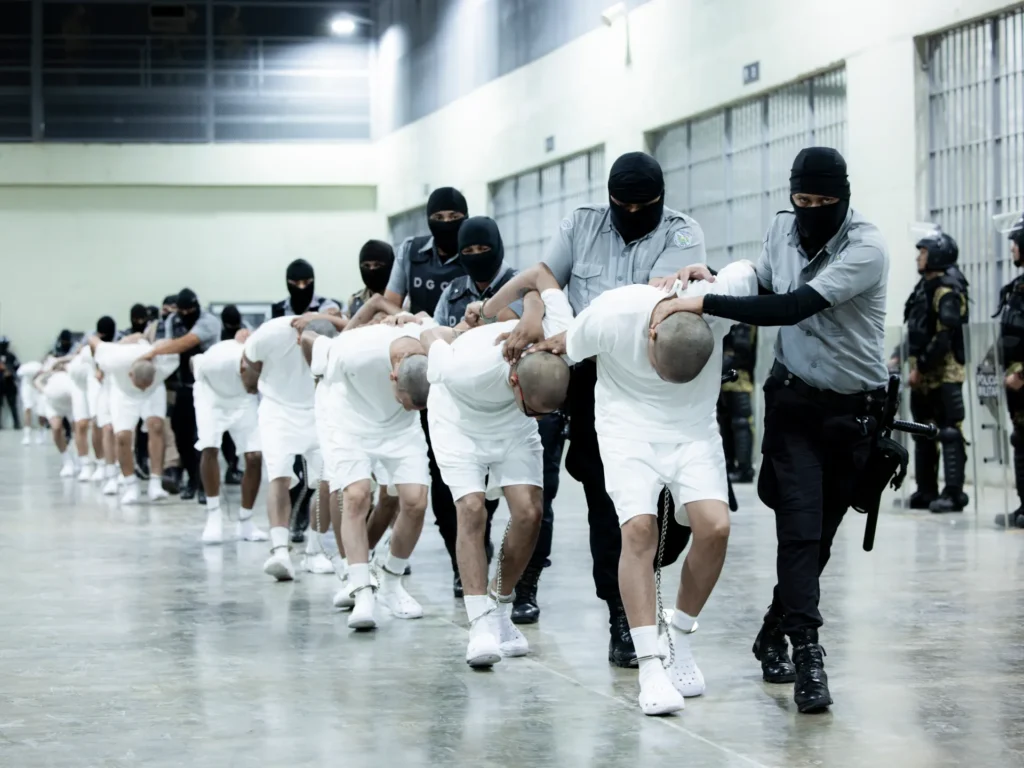In a late-night intervention, the U.S. Supreme Court has blocked President Donald Trump’s controversial use of a rarely invoked law to expedite the deportation of Venezuelan migrants, bypassing traditional due process.
The emergency ruling, issued on Saturday, revealed that two of the court’s most conservative justices dissented from the majority decision.
The order temporarily prevents the government from continuing to expel migrants under the 1798 Alien Enemies Act, a law historically employed to detain Japanese-American citizens during World War II. President Trump had invoked this law the previous month to deport Venezuelans to a high-security prison in El Salvador, known for housing thousands of that country’s gang members.
The Supreme Court’s decision was prompted by imminent plans on late Friday to deport additional Venezuelans under the act, which would have resulted in their expulsion with minimal opportunity to present evidence or contest their cases.
The court’s ruling stated, “the government is directed not to remove any member of the putative class of detainees from the United States until further order.” President Trump has defended the summary expulsions and the detention of individuals in El Salvador by asserting his administration’s commitment to combating violent Venezuelan criminal gangs, which have been designated as terrorist organizations by the U.S. government.
However, this policy has intensified concerns among opposition figures that the Republican president is disregarding constitutional norms in an effort to consolidate power. The dispute over the Alien Enemies Act coincides with the administration’s aggressive actions against major law firms, Harvard and other universities, and prominent independent media outlets.
The American Civil Liberties Union (ACLU), which spearheaded the legal challenge to halt Friday’s planned deportations, welcomed the Supreme Court’s ruling.
“These men were in imminent danger of spending their lives in a horrific foreign prison without ever having had a chance to go to court,” stated attorney Lee Gelernt.

On Saturday, the government filed a motion with the Supreme Court, arguing that it should not be prevented from utilizing the Alien Enemies Act to deport individuals deemed to be terrorists.
The government also contended that, even if blocked from using the Alien Enemies Act, it should be permitted to proceed with such deportations under other existing laws.
Tattoos and due process
President Trump’s victory in the November White House election was largely attributed to his pledge to combat what he characterized as an “invasion” of criminal migrants.
His rhetoric, which often depicted migrants as rapists and murderers posing a threat to suburban communities, resonated with a segment of voters concerned about high levels of illegal immigration.
President Trump has deployed troops to the Mexican border, imposed tariffs on Mexico and Canada for their alleged failure to curb illegal crossings, and designated gangs such as Tren de Aragua and MS-13 as terrorist organizations.
Right-wing influencer Laura Loomer, a frequent associate of President Trump, remarked on Saturday that the president was “gracious” for deporting individuals who entered the country illegally, rather than resorting to lethal force at the border.
Democrats and civil rights organizations have expressed alarm over what they perceive as an erosion of constitutional rights.
Under President Trump’s application of the Alien Enemies Act, which has historically been invoked during the War of 1812, World War I, and World War II, migrants have been accused of gang affiliations and deported to El Salvador without judicial proceedings or criminal charges.
President Trump has also publicly stated his willingness to send American citizens convicted of violent crimes to the notorious El Salvador prison, CECOT, located outside San Salvador.
Attorneys representing several deported Venezuelans have alleged that their clients were targeted primarily based on their tattoos.
In a highly publicized case, Maryland resident Kilmar Abrego Garcia was deported to CECOT last month before the Trump administration acknowledged that he was sent there due to an “administrative error.”
Despite a court ruling mandating the Trump administration to facilitate Abrego Garcia’s return, President Trump has maintained his stance, insisting that Garcia is a gang member, and even posted an apparently edited photo on social media Friday depicting MS-13 tattoos on Garcia’s knuckles.
As legal challenges mount, President Trump and his allies have consistently criticized what they perceive as “activist” judges.
Right-wing influencer Jesse Kelly, who commands a significant social media following, responded to the overnight order halting deportations by advocating, “Ignore the Supreme Court.”

